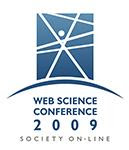The biggest event in Greece next week, and probably one of the biggest worldwide, is the Web Science Conference 2009: Society On-Line organized by the Web Science Research Initiative (WSRI). The conference will take place in Hellenic Cosmos, the cultural centre of the Foundation of the Hellenic world, from 18 to 20 of March.
Professor Sir Tim Berners-Lee, acknowledged by many as the inventor of the World Wide Web, will keynote the first day of the conference. Very few of the people I know will miss it.
For those not entirely familiar with the notion of Web Science, it is a multi-disciplinary research that attempts to bridge and formalize the social and technical aspects of collaborative applications running on large-scale networks like the web. In this respect, web science can help understand and address effectively a large part of the social impact of broadband.
I have compiled a short list of the conference’s papers (about half of the program is scientific in nature) that I’ve read and liked. I didn’t find much time to write about each of them, but the links supplied contain comprehensive abstracts and access to the full articles:
Experiments for Web Science: Examining the Effect of the Internet on Collective Action – The paper assesses experimental results to evaluate the implications of Internet and WWW on political behaviour and more precisely on people’s propensity to act collectively.
Is web-based interaction reshaping the organizational dynamics of public administration?: A comparative empirical study on eGovernment – The article explores the relationship between new governmental uses of the web for improving interaction and some of its traditional organisational features by evaluating three case studies: Catalonia, Sao Paolo and Quebec.
Social Meaning on the Web: From Wittgenstein To Search Engines – The article demonstrates a system that inspects the aggregate behavior of search engine users to approximate the social meaning of URIs (Wouldn’t that be awesome when/if materializes!)
Six Degrees of Separation in Online Society – The theory of six-degrees of separation (the average number of steps via which two individuals can be connected) for on-line societies is verified (although relationships patterns in online societies differ those of real-life’s). The tendency of online users to form ever enlarging groups may further bring down the degrees of separation.
Lessons from the Net Neutrality Lobby: Balancing openness and control in a networked society – Draws conclusions from the Network Neutrality debate on network traffic to address the most appropriate relation between opennes and control in web cooperative systems.
All papers can be accessed via the conference program.



